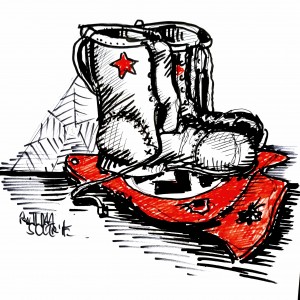WITH THE RED CAVALRY, CLEVELAND
Most every Jewish baby boomer in Cleveland grew up around Holocaust survivors, unless he lived in Shaker Heights, and even in Shaker there were probably a few DPs in the double houses.
I had a classmate at Brush High who retold his parents’ Nazi horrors to the local newspaper in the 1960s — pre-Holocaust (before the word Holocaust went big-time). Joe was a super Jew. Joe’s father worked at a kosher poultry market. Joe often stayed home for obscure (to me) Jewish holidays. Some of the Jewish kids teased him when he came back. (The goys didn’t notice.)
I copied Joe’s style. I wrote a letter to the Cleveland Press protesting the U.S. Christmas stamp, which had a religious symbol (Madonna and child), 1966. I said the new stamp violated the separation of church and state. I got letters back. One reader wrote, “Go to Vietnam where men are men and not homosexual like you.” That got me to write more letters. I wrote about Poland expelling its last Jews in 1968. I vied with Joe for champion of Jewish teenage letter writers. All I had to do was write Jew, and I would get half-baked, vitriolic feedback. I enjoyed that. I had been through so little. I wanted to experience World War II. Then I’d go home and eat some Jell-O.
—
Alex Kozak sold record albums and sewing machines. Appliance store owners used to sell records; I got Bechet of New Orleans and Be Bop Era (RCA Vintage Series) from Mr. Kozak. He was a World War II  Red Army veteran — a Hungarian Jew who escaped the Nazis and fought with the Russians. I borrowed his cavalry boots for my high school Canterbury Tales presentation. Mr. Kozak was big — about one-and-a-half Isaac Babels.
Red Army veteran — a Hungarian Jew who escaped the Nazis and fought with the Russians. I borrowed his cavalry boots for my high school Canterbury Tales presentation. Mr. Kozak was big — about one-and-a-half Isaac Babels.
I knew Mr. Kozak through my parents, who often socialized with Holocaust survivors. My dad liked the men; many were into baseball and were for the most part no-nonsense. What was there to talk about — the good old days? Keep it short. My dad liked that.
At a Yiddishe Cup gig in Detroit, I ran into Mr. Kozak’s daughter. She said her nephew had the cavalry boots now — the ones Mr. Kozak had worn into Prague with the Soviets in 1945.
Lime Jell-O. That was the best.
—
“Joe” is a pseudonym, re: my high school friend.




5 comments
Plate o’ shrimp! Just been reading the Red Cavalry stories as part of the Yiddish Book Center’s online reading group. I’m enjoying the newer Peter Constantine translation. I should compare it with my older Walter Morison (which also has an intro by Lionel Trilling) and was once owned by R Radner. But the 1960 cheapo binding is failing. I might find myself a few pages short.
Jell-0 was started by a guy in LeRoy, NY — between Rochester and Buffalo. We visited the guy’s stone mansion once and took photos. In Rochester most of my connections with Holocaust survivors were with Hebrew School teachers (some Israeli, too) and when I went to an Orthodox synagogue, such as Beth Sholom. My Brighton suburb had very few through the ’60s but many lived in the older Jewish neighborhoods and the kids went mainly to Monroe and Franklin High Schools. However, in the 1950s and ’60s I always knew many of the group that came from Europe much earlier — 1880s to early 1920s. Many belonged to the Orthodox synagogues but were not personally that observant. This included many relatives. One side from Europe, the other side American-born, and these differences, along with when the ancestors came here (my grandparents’ or parents came between 1872 and 1910), often surfaced up with degree of assimilation of the descendants.
I have a good friend whose father and uncle spent the war with the Bielski brothers in Belarus. She wasn’t aware of the movie Defiance, which portrayed the Bielski brothers resistance until I watched it with her. Great movie with the Jews as heroes.
A childhood friend of my mother was a nurse in Auschwitz. His father was also a survivor. His mother wrote a book about her experiences. He worked for Hasbro toys in RI after the war. They were Jewish-owned and hired a number of survivors. He eventually bought a farm in Rhode Island and became an egg farmer. Many survivors had egg farms in New Jersey.
I grew up in Lakewood, Trinity Lutheran Church. Martin Luther, say what you will, penned some great tunes — “A Mighty Fortress is Our God” and “Away in a Manger” are prime examples.
I also grew up around Holocaust survivors. Namely, my parents. I also ate jello. Lots of it. Plenty of guilt associated with food. My parents used to remind me how little food they had in the camps. I’ve had it good in my life, but I could never take away my parents’ pain and that hurt.
Leave a Comment